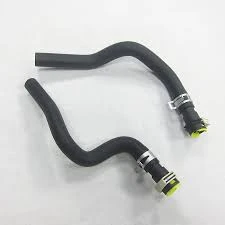rubber oil seal
Understanding Rubber Oil Seals Essential Components for Industry and Mechanics
Rubber oil seals are integral components used across various industries, including automotive, manufacturing, and engineering. These seals play a crucial role in preventing the leakage of fluids and maintaining the integrity of machinery. In this article, we will delve into the composition, function, applications, and advantages of rubber oil seals, providing a comprehensive overview of their importance in mechanical systems.
Composition and Design
Rubber oil seals are primarily made from elastomers, which can endure the harsh environments typically associated with oil and other fluids. Common materials used for rubber oil seals include nitrile rubber (NBR), fluorocarbon rubber (FKM), and silicone rubber (VMQ). Each material has unique properties that make it suitable for specific applications. For instance, nitrile rubber exhibits excellent resistance to petroleum-based oils, while fluorocarbon rubber offers superior performance in high-temperature and chemical-resistant applications.
The design of rubber oil seals generally consists of a circular or annular shape that fits snugly around a rotating shaft. The seal includes a metal outer casing for increased strength and durability, along with a flexible lip that makes contact with the shaft. This design ensures a tight seal that prevents the leakage of lubricants and contaminants while allowing for smooth rotational movement.
Functionality
The primary function of rubber oil seals is to prevent the escape of lubricants, such as oil or grease, from mechanical systems while also keeping external contaminants, such as dirt and dust, from entering. This sealing action helps maintain the necessary lubrication for moving parts, thus reducing friction and wear. By providing a reliable barrier, oil seals contribute to the overall efficiency and longevity of machinery and engines.
In automotive applications, rubber oil seals are commonly found in critical components such as engine crankshafts, transmission systems, and differentials
. Here, they prevent engine oil from leaking and protect the internal components from harmful debris. Similarly, in industrial machinery, oil seals help ensure that hydraulic and lubrication systems function correctly, which is vital for maintaining equipment performance and reducing maintenance costs.Applications
rubber oil seal

The versatility of rubber oil seals extends across numerous industries. In the automotive sector, they are vital in engines, gearboxes, and drive shafts. In manufacturing, oil seals are used in hydraulic and pneumatic systems, ensuring proper functioning and preventing downtime. Agricultural machinery, aerospace, and various home appliances also rely on rubber oil seals for consistent performance.
Additionally, rubber oil seals are applicable in various contexts, such as pumps, compressors, and turbines, where fluid containment is necessary. As industries evolve, the demand for robust, efficient, and reliable sealing solutions continues to grow, further solidifying the importance of rubber oil seals in modern technology.
Advantages of Rubber Oil Seals
Rubber oil seals offer several advantages that make them particularly valuable in many applications. Firstly, their ability to withstand a wide range of temperatures and pressures ensures they can perform effectively in diverse environments. Depending on the rubber compound used, these seals can operate in extreme conditions, providing reliable sealing under temperature variations and high mechanical loads.
Secondly, rubber oil seals are cost-effective solutions that help reduce maintenance and operational costs. By preventing leaks, they minimize the waste of lubricants and reduce the need for frequent maintenance, which can be both time-consuming and expensive.
Moreover, rubber oil seals are relatively easy to install and replace, which is a significant benefit for maintenance personnel. Their design allows for quick implementation, reducing downtime and keeping production processes running smoothly.
Conclusion
In conclusion, rubber oil seals are vital components in a myriad of applications, serving as protective barriers that ensure the efficiency and longevity of mechanical systems. Their unique properties, diverse applications, and advantages make them indispensable in industries ranging from automotive to manufacturing. As technology continues to advance, the demand for high-performance rubber oil seals will undoubtedly grow, underscoring their importance in innovation and efficiency across various sectors.
-
Simplifying Oil Changes: A Comprehensive Guide to Oil Drain Plugs and Their Variants
News Aug.04,2025
-
Mastering Oil Drain Maintenance: Solutions for Stripped, Worn, and Upgraded Oil Plugs
News Aug.04,2025
-
Fixing Oil Pan Plug Issues: Leaks, Stripped Nuts, and the Right Replacement Solutions
News Aug.04,2025
-
Everything You Need to Know About Oil Drain Plugs: Sizes, Fixes, and Upgrades
News Aug.04,2025
-
Choosing the Right Oil Drain Plug: A Guide to Sizes, Materials, and Drain Innovations
News Aug.04,2025
-
A Complete Guide to Automotive Drain Plugs: Types, Problems, and Innovative Solutions
News Aug.04,2025
-
The Ultimate Guide to Car Repair Kits: Tools and Essentials Every Driver Should Own
News Aug.01,2025
Products categories















